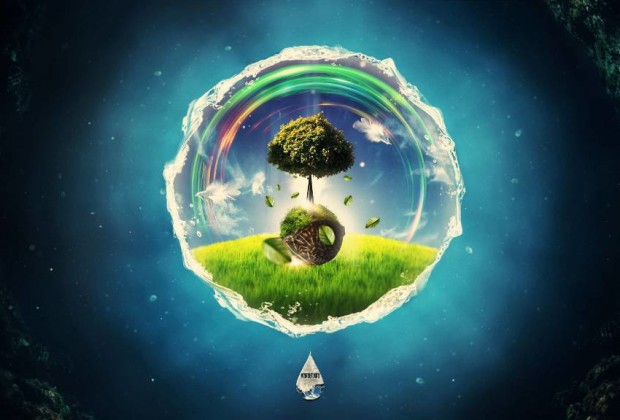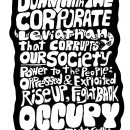by Joshua Farley
[column width="47%" padding="6%"] The resource crises we currently face are orders of magnitude more serious than the Great Depression, as they threaten not only the economic system but also human survival.
Unfortunately, conventional economists frequently argue that there are no binding resource constraints on economic production other than human ingenuity (i.e., knowledge), which they claim is essentially limitless. Through the magic of market forces, as a resource becomes scarcer, its price increases, creating incentives to use the resource more efficiently or to develop substitutes. For example, as wood became scarce as an energy source, we developed coal as a substitute, followed by oil and natural gas. We are now developing heavy crude, oil shale, and tar sand. From this perspective, our ingenuity, guided by market forces, eliminates the problem of absolute scarcity.
However, it is no coincidence that both the market economy and the carbon economy emerged together during the eighteenth century. Market production has increased in tandem with the use of fossil fuels. It takes an estimated 25,000 hours of human labor to generate the energy found in one barrel of oil. Many examples of innovation induced by growing scarcity and rising prices are actually examples of increased reliance on fossil fuels. For example, as we ran short of land to meet the global demand for food, we learned to convert natural gas into biologically active nitrogen and petrochemicals into an array of pesticides, herbicides, and fungicides. By shifting from animal-powered to fossil-fuel-powered traction and transport, we freed up land previously used to feed animals. The magic of fossil fuels is more responsible for economic production than the magic of the market.
Unfortunately, our capacity to continually increase fossil-fuel use to power ever-increasing economic production has ended. Fossil-fuel stocks are finite and we have already used up the most accessible supplies with the highest net-energy gains. Fossil-fuel emissions threaten climate stability, hence agriculture and civilization. The age of the carbon economy is coming to an end.
The most serious problem we currently face is waste absorption capacity, particularly for carbon dioxide. While there is no limit to the stock of carbon dioxide that the atmosphere can hold, the natural rate at which carbon dioxide is removed from the atmosphere appears to be about 20 percent of current emission rates. We must therefore reduce current emissions by 80 percent to stabilize atmospheric carbon dioxide stocks, and how fast we do so determines whether the atmospheric stock will finally stabilize at 350 parts per million (ppm), posing little risk of catastrophic climate change, or 550 ppm or more, posing a substantial risk. If we fail to eventually reduce emissions by 80 percent, atmospheric stocks will simply continue to increase, and with them the risk of catastrophic change.
Society currently faces two critical and conflicting thresholds. The first is an economic threshold. Without fossil fuels, existing technologies could not satisfy the basic needs of 7 billion humans. If we reduce fossil-energy consumption below some minimum level, perhaps 40 percent of current use, our economy is likely to collapse.
The second is an ecological threshold. If we fail to reduce carbon emissions by at least 80 %, run away climate change may cause agriculture and hence civilization to collapse. Bridging the gap between these two critical thresholds requires new, more environmentally benign technologies, including solar energy.
Money plays a critical role in determining how resources are allocated— and the existing financial system is not sustainable, just, or efficient. A growing economy requires more money to chase more goods and services. Most money is created when the financial sector simply loans it into existence. The money is destroyed when the loans are repaid, but borrowers must also pay interest. If the economy is not growing, then interest payments are a zero-sum game: a transfer of resources to the financial sector, creating intense pressures for economic growth requiring yet more money creation, which is unsustainable on a finite planet.
SOLUTIONS
Given the financial and ecological crises faced by our complex ecological economic system, how do we proceed? Based on extensive research, systems theorist Donella Meadows identified several places to intervene in complex systems: changing the paradigm, changing the goals, and changing the rules.
Changing the Paradigm: What's Possible?
A paradigm is a worldview, a philosophical framework that provides the underlying support to our actions and institutions. The dominant economic paradigm of our civilization sees economic activity as largely separate from physical and ecological realities. Several elements of this paradigm must change: [/column]
1. We must recognize that the economy is not whole unto itself, capable of endless expansion. Rather, it is part of something larger— specifically, it is a subsystem of the sustaining and containing global ecosystem. The degradation of the planetary ecosystem is an unavoidable cost of physical economic growth. Once it becomes obvious that infinite economic growth is impossible, the key allocation question is how much economic structure can be converted into economic production and waste, and how much must be conserved to provide vital life-support functions.
2. We must recognize that the economy is not just a complicated system that can be managed by the single feedback signal of prices.
3. We must recognize that competitive markets are not suitable for allocating all resources and that humans are social animals capable of both competition and cooperation. Different institutions can elicit different degrees of cooperation and competition.
Changing the Goals: What's Desirable?
We must ask ourselves, “What, ultimately, is socially, psychologically, and ethically desirable?” To create a sustainable post-carbon economy, we must create a new shared vision of a sustainable and desirable future emphasizing healthy ecosystems, communities, and people over ever-increasing consumption.
Some specific institutional changes are necessary to bring our economic systems back in line with both our biologically inherited values and our long-term sustainability needs:
1. We must create institutions that protect, enhance, and declare common ownership of those resources created by nature or by the shared efforts of society.
2. The right to create and destroy money must be removed from the financial sector and restored to the public sector, which should then use it to enhance the public good. Specifically, this would require 100 percent reserve requirements for the private financial sector, which would no longer be able to loan money into existence. The goals of the public financial sector would be ecological sustainability, just distribution, and the efficient allocation of resources toward maximizing quality of life.
3. We need a new Bretton Woodstype agreement for the international economy. A new agreement must be created in response to the current ecological and resource crises, and it must promote the cooperative provision of resources, the stable contraction of the market economy, the convergence of global consumption levels, and the improvement of global quality of life.
NEXT STEPS
The challenges of developing a post-carbon economy are formidable, but so are the resources available. Per capita GNP in the United States has more than doubled since 1969, which suggests that if the United States dedicated half its GNP to solving the problem, its citizens could still sustain a 1969 standard of living.
Straightforward solutions exist, but they require fundamental changes to the existing system. How can individuals help create such massive changes? Donella Meadows’s leverage points still apply:
...Change the paradigm— spread the word. We must understand and disseminate a new economic paradigm recognizing that the human economy is sustained and contained by the global ecosystem, and together they form a single complex system subject to the laws of physics and ecology.
...Change the goals— set the example. We must show that it is possible to live within the planet’s biophysical limits while improving our quality of life by relocalizing our communities and adjusting our lifestyles for the realities of the post-carbon world.
...Change the rules— speak up for change. We must push for the reform of our political and economic institutions so that they once again act for the public good. From local government policies to international agreements, the structures that define how our world works are ultimately products of political consent, and thus can be changed with sufficient political will.
Joshua Farley's research focuses on the design of an economy capable of balancing what is biophysically possible with what is socially, psychologically and ethically desirable. He is co-author with Herman Daly of Ecological Economics (2010).
[end_columns]




 (909) 335-8100 ·
(909) 335-8100 ·  (909) 335-6777
(909) 335-6777 Email:
Email: